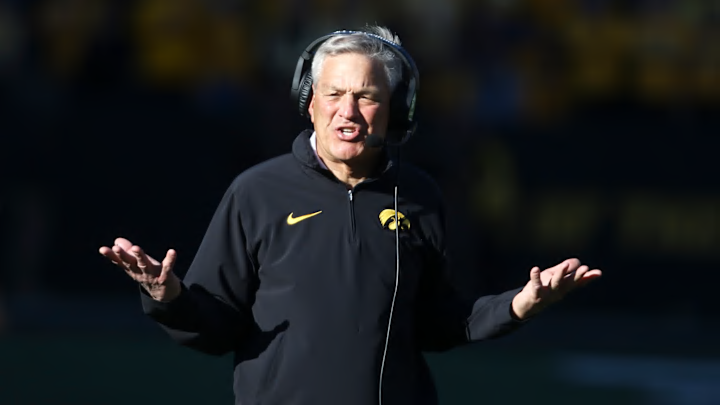In 2024 and beyond, the Big Ten will go without divisions as 18 teams make up the conference. The Big Ten isn't alone. The SEC and ACC will be doing the same thing, and the Big 12 has operated in this capacity for a few years now.
Foregoing divisions does ensure the two best teams play for the conference championship. However, the nature of college football's, well, 'unique' form of parity would indicate that not all 18 teams will be playing from the same starting line.
To be brutally realistic, until teams like the Iowa Hawkeyes give anyone a reason to think otherwise, they'll be firmly slotted into a role of "everything has to go their way to have a shot at reaching the conference championship game." That's true of every team, but it can come across as more demeaning to certain programs.
But you can bet Ohio State, Michigan, USC, Oregon, and, to a degree, Penn State will be the most likely candidates year in and year out.
Even though Iowa reached the conference championship in two of the past three seasons, the two asterisks remain that A.) they didn't come close to winning either time and that B.) they got there because of divisions.
For 10 years the Big Ten had East and West divisions and for 10 years the East won. Not since 2011 and 2012, when the divisions were the Leaders and Legends, has a team outside of OSU, Michigan, PSU or Michigan State won the conference. That was Russell Wilson's Wisconsin Badgers, to put that in perspective.
So is Iowa relegated to a mid-card Big Ten program, destined to put up a good fight but never quite grab that brass ring?
Some programs, even Power 4 programs, are just looking to get as close to 10 wins as possible and get a good bowl game. Is that Iowa in this new-look conference?
And how does that change Kirk Ferentz's job status? Ferentz has been with the program for 25 years, but a conference title hasn't come back to Iowa City in 20 years now. Appearing in the conference championship a few times since helps brighten the perception of the program, but if a drought begins under this new format, that perception sours.
It's a fact, Iowa doesn't go 10-2 or 11-1 as often as Michigan, Ohio State and Penn State. With the understanding that if Michigan and Ohio State each lose just one game they are likely in the conference championship, does Ferentz get even more slack?
Those questions can be summarized into one downright depressing question: Is above-average play at Iowa going to be the standard of competency?
This isn't an attack on Iowa Hawkeyes football. Heck, I think Iowa can make some noise with their given schedule and some good fortune on the injury reports. It's a larger question that programs in the same boat such as Washington, Wisconsin and maybe even Penn State will have to ask themselves with every year that passes without a conference championship appearance, especially if they are missing out with nine or 10 wins or more.
True, the College Football Playoffs expanding to 12 teams, and possibly even further, grants teams the opportunity to find postseason success without a conference championship, but that isn't a guarantee for growth in the recruiting trail and Transfer Portal.
It's something to ponder this offseason, at the very least. After all, no one wants to shift the goalposts of what constitutes a successful season for their football team. But you often don't realize it's happened until it's too late.
Just look at Nebraska.
Up Next:
